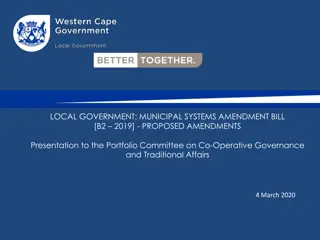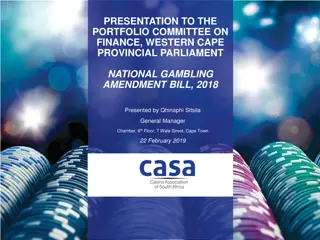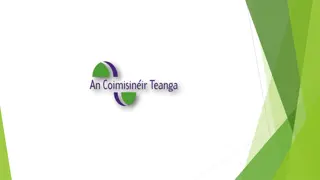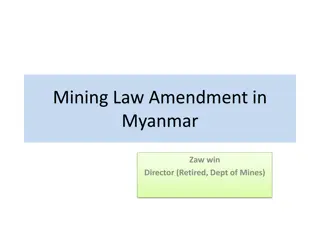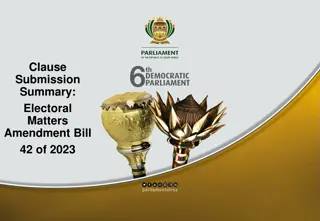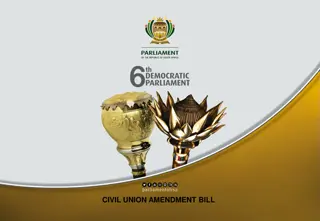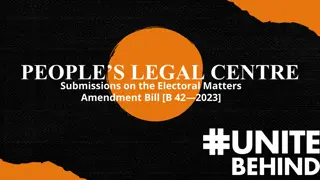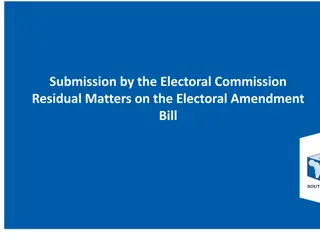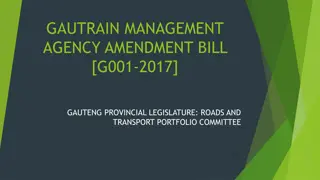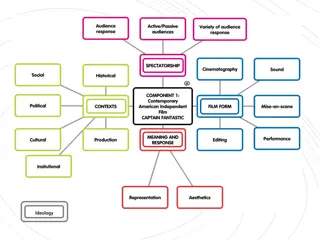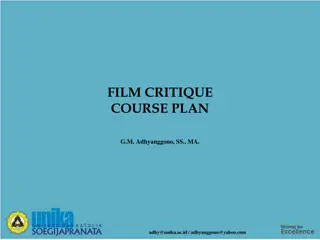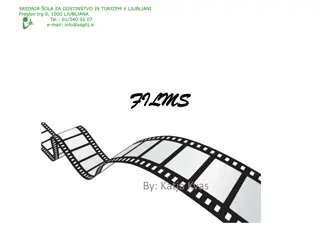Films and Publications Amendment Bill 2015 - Department of Communications Presentation
The Films and Publications Amendment Bill 2015 aims to align with international standards for regulating online content distribution, combat illegal content, establish co-regulation for digital content classification, and enhance responsibilities of internet service providers regarding consumer and child protection from harmful online content.
Download Presentation

Please find below an Image/Link to download the presentation.
The content on the website is provided AS IS for your information and personal use only. It may not be sold, licensed, or shared on other websites without obtaining consent from the author. Download presentation by click this link. If you encounter any issues during the download, it is possible that the publisher has removed the file from their server.
E N D
Presentation Transcript
Films and Publications Amendment Bill, 2015 Department of Communications Presentation to the PCC 23 February 2016 1
The purpose of the Bill The Bill seeks to align with international best practice on matters regarding the regulation of distribution of online content; The Bill further seeks to strengthen efforts to combat the online distribution of illegal content as defined in the Films and Publications Act 65 of 1996, as amended (the Act ); The Bill seeks to establish a co-regulation regime for classification of digital content distributed online; and The Bill seeks to amplify responsibilities of internet service providers in matters regarding the protection consumers and children against sexual content, hate speech and racism contained in user-generated content. 2
Background to legislative review In May 2012, the Appeal Tribunal ruled against the FPB in the classification of The Spear ; In September 2012, the Constitutional Court declared section 16(2) of the Act unconstitutional; In 2013, the Appeal Tribunal found the regulations of the Act dealing with the process for handling child pornography not aligned to the constitutional case of De Reuck and ruled against the FPB; In the recent years there has been an proliferation of posting and uploading of private sex video and videos depicting violence on Facebook, twitter and You-tube. 3
Overview of suggested amendments The Bill seeks to address the shortcomings in relation to classification, compliance monitoring and usage of new media & social networking sites; The Bill also seeks to align certain definitions to various judgements of the constitutional court and the Appeals Tribunal; The Bill establishes a penalty committee to address public complaints and administrative offences committed by distributors and industry; and The Bill also provides for the accreditation of foreign classification systems for online content. 4
Suggested amendments Section 1 Section 1 of the Bill inserts and amends certain definitions as outlined below. The definition of artistic has been revised to mean predominantly aesthetic accordingly to the reasonable person. The definition of child pornography has been revised by the deletion of the words includes and or in such a manner that it is capable of being used for the purposes of sexual exploitation ; 5
Suggested amendments continued Section 1 continued.. The definition of penalty committee has been added; The definition of press council has been added; The definition of press ombudsman has been added; The definition of publication has been revised to include website ; The definition of sexual conduct has been revised by the deletion of male with reference to genitals, and the addition of anus, vagina, testicles and penis ; and The definition of social media has been added. 6
Suggested amendments continued Section 2 The objects of the Act have been revised by the substitution of the following paragraph (d) criminalise the possession, production and distribution of child pornography in order to extensively provide for the protection of children against child pornography; and the insertion of paragraph (e) in order to create offences for non- compliance with the classification decisions of the FPB. 7
Suggested amendments continued Section 6 Section 6 of the Act has been revised with the inclusion of the Penalty Committee and provision regarding the membership and required experience of the members thereof. Section 7, 8 & 9 Sections 7, 8 & 9 of the principal Act has been revised with the inclusion of reference to the Penalty Committee . 8
Suggested amendments continued Section 9A Section 9A has been amended by making provision for accreditation of foreign classification systems, the conclusion of foreign distribution agreements and the exemption of online distributors from the pre- distribution classification requirements in relation to films, games and publications. Sections 12, 13 &14 These sections which deal with remuneration, expenditure and the annual report respectively, have been amended with the inclusion of reference to the Penalty Committee. 9
Suggested amendments continued Section 15A This section has been amended in order to clarify the manner in which compliance officers must act upon entering premises and further makes provision for the deployment of police officers. Section 15B This section establishes an independent Penalty Committee responsible for investigating and adjudicating over all cases of non- compliance with any provision of the Act. 10
Suggested amendments continued Section 16 Magazines and any other advertisement falling within the jurisdiction of the Advertising Standards Authority of South Africa are exempted. The classification provided for in subsection (2) must be dealt with timeoulsy in order to avoid any unreasonable delays. Subsection (4)(b) has been revised to refer only to explicit violent sexual conduct, bestiality, incest, or rape, explicit infliction of domestic violence, explicit visual presentations of extreme violence . This section no longer includes child pornography or material classified X18 . 11
Suggested amendments continued Section 18 Subsection (3)(b) has been revised to remedy the vagueness thereof which resulted in the provision being deemed to be unconstitutional. Consequently, it only makes reference to explicit violent sexual conduct in order to distinguish the XX category from the X18 voluntary sex category. This subsection further omits child pornography from the exemption. Subsection (6) excludes broadcasters which are subject to regulatory authority of the Independent Communications Authority of South Africa ( ICASA ). Streaming content through the internet is not regarded as broadcasting and to this end subsection (7) has been inserted. 12
Suggested amendments continued Sections 18A and 18B These sections which deal with the display of classification decisions and re-classification have been deleted. Section 18C This section makes provision for independent classification of digital films, games and publications by distributors of online content who are registered with the FPB. 13
Suggested amendments continued Section 18D The FPB may recognize a foreign classification system upon application by an online distributor, subject to alignment of the foreign ratings to the FPB s classification guidelines and payment of the prescribed fee. Section 18E Members of the public may lodge complaints to the FPB regarding unclassified, prohibited content, or potential prohibited content distributed online. The FPB may issue a take-down notice, a service-cessation notice or a link deletion notice. In the event that such content contains child pornography the FPB must refer the matter to the SAPS or hotline in the country concerned where the content is hosted outside the geographical boarders of South Africa. 14
Suggested amendments continued Section 18F In terms of this section it is an offence to distribute private sexual photographs and films with the intention of causing that individual distress in any electronic medium including on the internet and social networking sites without the consent of the individual who appears in such photographs or films. The only circumstances under which such disclosure may be made is where it is necessary for the purposes of preventing, detecting or investigating a crime. 15
Suggested amendments continued Section 18I Only content which has been classified may be distributed in South Africa and such content must clearly display the classification decision. Section 18J Members of the public may apply for a less restrictive classification for content after a period of 2 years from when the content was initially classified. Furthermore, any aggrieved member of the public may apply for the reclassification of content and the distributor will be afforded the opportunity to make representations in response thereof. 16
Suggested amendments continued Section 19 The Minister has been removed as a potential complainant and appellant in light of the fact that it is the same Minister who appoints the Appeal Tribunal and the Council, which in turn appoints the chief executive officer ( CEO ) in consultation with the Minister. Consequently, any person may lodge a complaint with the FPB regarding a classification decision. 17
Suggested amendments continued Section 20 The Minister has been removed as a potential complainant for the same reasons as outlined with respect to section 19. Consequently, any person may lodge a complaint with the FPB regarding a classification decision. A distributor who is a member of an industry classification body cannot appeal decisions of that body to the Appeal Tribunal. In the event that the FPB imposes a more onerous classification upon application for reclassification (as envisaged in section 18G) then the distributor may appeal to the Appeal Tribunal. 18
Suggested amendments continued Section 24 X18 material may be distributed online by a registered distributor provided that the FPB is satisfied that the distributor has mechanisms in place to ensure that the material will not be distributed to children under the age of 18 and the classification details are clearly displayed throughout the screening thereof. Furthermore, the distributor must keep a register of all users and the register must be made available to the CEO where he has reason to believe that the distributor is in contravention of the conditions set out above. The exemption afforded to the distributor may be suspended for a maximum period of 12 months where the distributor is found in contravention of this section. 19
Suggested amendments continued Section 24A The maximum fines have been specified and the maximum period of imprisonment has been extended to eight months. Subsection (2) exempts broadcasters which are subject to the regulatory authority of ICASA and newspapers, magazines or advertisements which are subject to the regulatory authority of the Press Ombudsman. Subsection (3) now makes provision for material which would have been classified X18 had it been submitted for classification and further provides for the monetary amount of the fine. Subsection (4) omits the exemptions for science, literary or artistic merit and aligns it with the provisions of section 18 with the addition of the words which would have justified an X18 classification . 20
Suggested amendments continued Section 24B The maximum fines and the maximum period of imprisonment have been specified. Section 24C The maximum amount for the fine has been specified. Section 24D The section has been inserted and provides that any person who provides the FPB with false information on its online system will be guilty of an offence and liable upon conviction to a maximum fine of R15,000 or imprisonment for a maximum period of six months, or both. 21
Suggested amendments continued Section 24E This section has been inserted and provides that any person who knowingly distributes private sexual photographs and films without the prior consent of the individual appearing in the said films and photographs with the intention to cause such individual distress shall be guilty of an offence and liable upon conviction, to a fine not exceeding R150,000 or to imprisonment for a period not exceeding two years or both. 22
Suggested amendments continued Section 24F This section has been inserted and provides that any person who knowingly creates, produces or distributes in any electronic medium including the internet and social networking sites any film or photograph which contains depictions or scenes of sexual assault and violence against children shall be guilty of an offence and liable upon conviction, to a fine not exceeding R150,000 or to imprisonment for a period not exceeding two years or both. Section 24G This section has been inserted and provides that any person who knowingly distributes any film or game which advocates propaganda for war, incites violence, or advocates for hatred based on race, ethnicity, gender or religion, and that constitutes incitement to cause harm shall be guilty of an offence and liable upon conviction, to a fine not exceeding R150,000 or to imprisonment for a period not exceeding two years or to both. 23
Suggested amendments continued Section 25 The heading above the section has been amended to internet, extra- territorial jurisdictions and presumptions of proof and the rest of the chapter has been amended accordingly. Section 30 Subsection (4) which provides for a fine by agreement has been repealed in light of the introduction of the Penalty Committee in section 15B. 24
Suggested amendments continued Section 31 Subsection (3)(b) repeals reference to the FPB and replaces it with reference to the Council which shall be responsible to publish the classification guidelines in consultation with the Minister. 25
THE END I THANK YOU 26
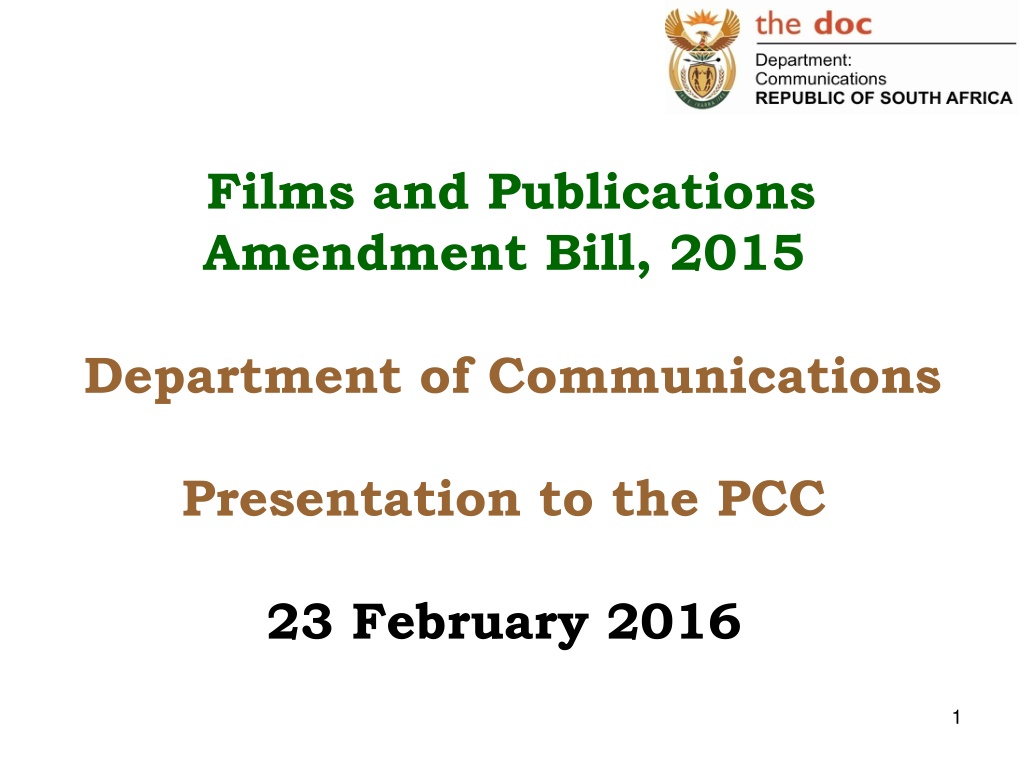

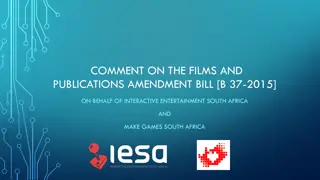

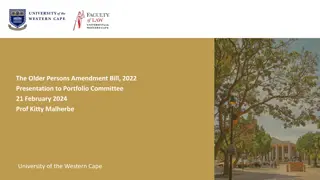
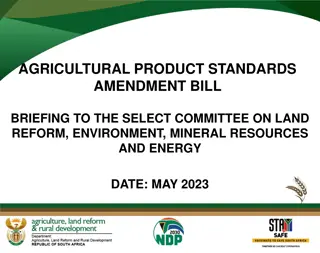
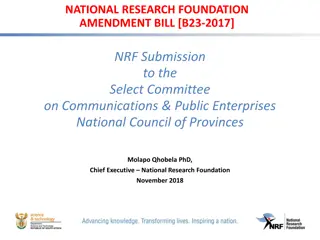
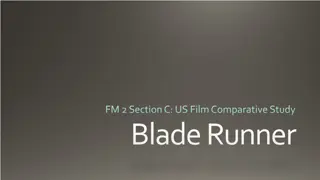
![RE: ELECTORAL MATTERS AMENDMENT BILL [ B42-2023]](/thumb/18837/re-electoral-matters-amendment-bill-b42-2023.jpg)
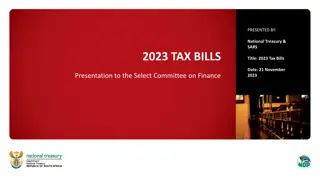
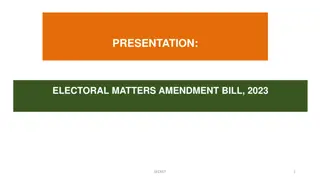



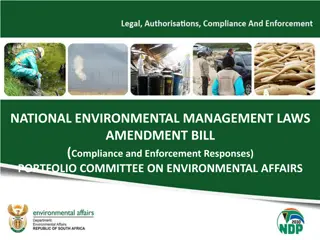
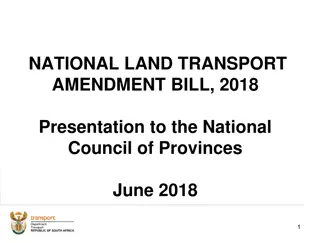
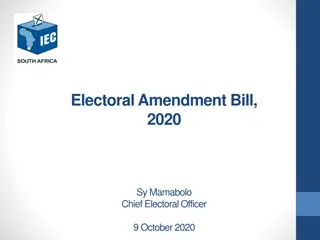

![Briefing on the Criminal Procedure Amendment Bill [B12-2021] to the Portfolio Committee on Justice and Correctional Services](/thumb/157093/briefing-on-the-criminal-procedure-amendment-bill-b12-2021-to-the-portfolio-committee-on-justice-and-correctional-services.jpg)


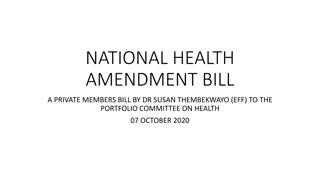
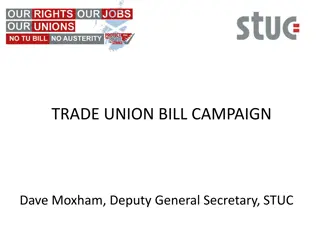
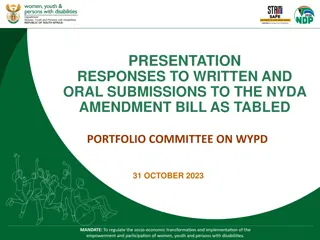


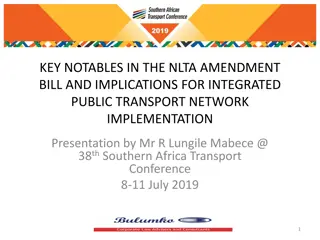
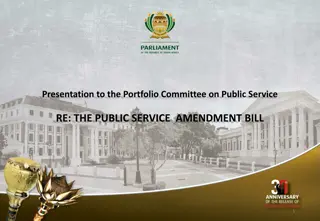
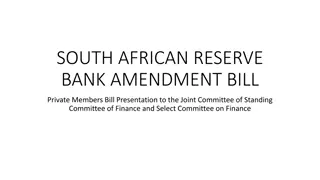
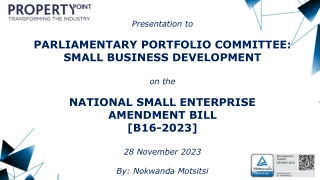
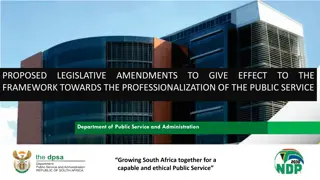
![Enhancing Corporate Transparency: Analysing The Companies Amendment Bill [B27B-2023]](/thumb/60028/enhancing-corporate-transparency-analysing-the-companies-amendment-bill-b27b-2023.jpg)
